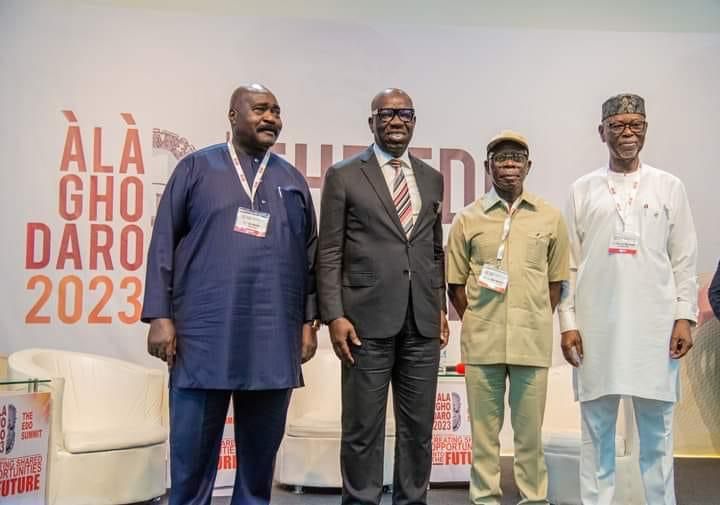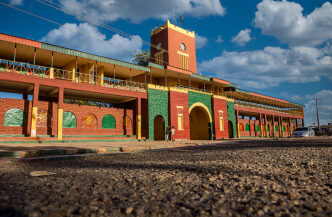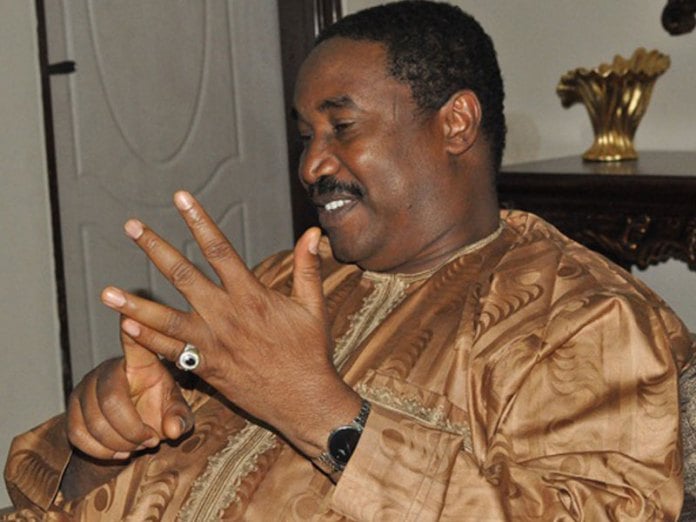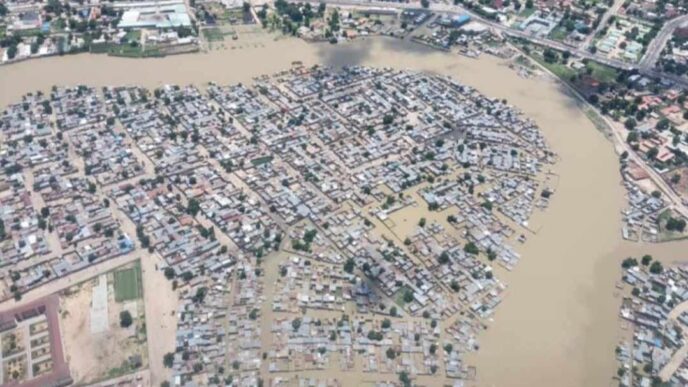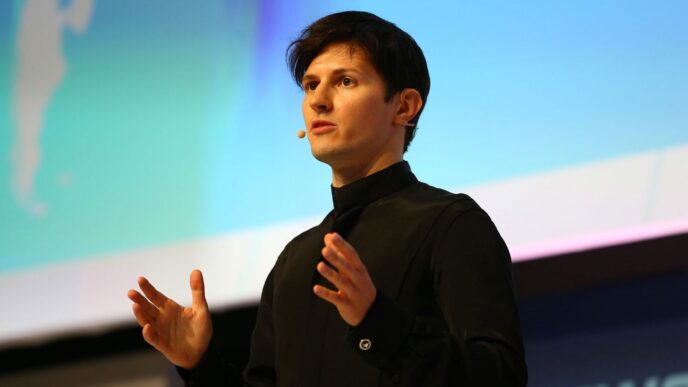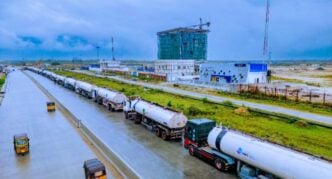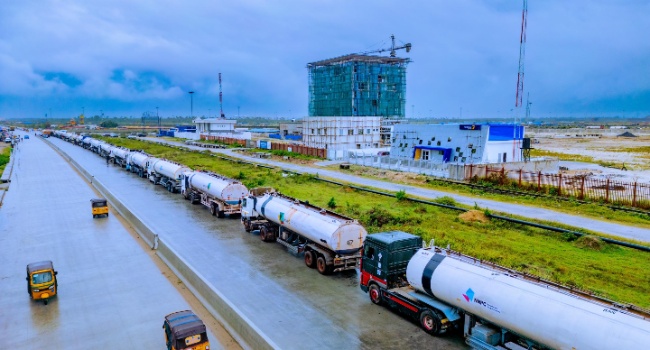From Left to Right: Lucky Igbinedion, Godwin Obaseki, Adams Oshiomhole, John Oyegun
BY TEMIDAYO TAIWO-SIDIQ
In a few hours, the people of Edo state will head to the polls to elect their next governor for the upcoming four-year term. This election is expected to usher in the fifth democratically-elected governor since John Odigie-Oyegun, who served during the aborted Third Republic.
True to expectations, the political landscape in Edo has been polarised following the commencement of electioneering campaigns, dominated by partisanship and personal interests. It will be crucial however, for the Edo Electorate to transcend these narrow interests in favour of a more inclusive and innovative approach to leadership.
Edo’s strategic importance in Nigeria’s political landscape cannot be overstated. Located at the crossroads of Nigeria’s Northern, Western, and Southern regions, Edo state is pivotal to national integration and development. The state’s rich cultural and political history, as well its contributions to Nigeria’s global standing highlight its importance. Importantly also, Benin City, the state capital, is one of the oldest cities in Black civilisation and among the oldest-surviving capital cities in the country.
Advertisement
Edo state has also been home to influential figures across various strata of society – from Chief Anthony Enahoro, a key player in Nigeria’s quest for independence, to global music sensation, Divine Ikubor popularly known as “Rema,” Nigeria’s media landscape for example, boasts significant contributions courtesy of Edo indigenes. with three of Nigeria’s top privately-owned TV channels founded by Edo citizens.
In addition to its prominent traditional institution, the state is home to the country’s first private university, and has produced renowned personalities across faith-based organisations, entertainment, and sports, underscoring Edo’s profound influence across various sectors. It is evident that no comprehensive list of Nigeria’s notable personalities would be complete without mentioning an Edo name.
Personal connection and historical context
Advertisement
Having been born, raised, and educated in Benin City, the state capital, I have had the opportunity to traverse all three senatorial districts of Edo state—central, north, and south. My family’s connection to Edo state is particularly meaningful, as a prominent street is named after my late father in the capital city, having moved to, and lived in Benin at around 16 years old. His life and legacy have instilled in me a deep understanding and appreciation of the state’s unique socio-political dynamics.
I witnessed various administrations in Edo state, from military administrators – Group Captain Baba Adamu Iyam and Navy Captain A.I. Onyearugbulem, to Chief Lucky Igbinedion, Professor Oserheimen Aigberadion Osunbor (who was ousted), Comrade Adams Oshiomhole, and Governor Godwin Obaseki during a part of his first term. My engagement with these administrations began when I was of age to understand political developments in Nigeria and continued until my permanent relocation from the state in 2017.
To cap it, as a Yoruba man married to a Benin woman, my son carries Benin heritage. This is in addition to a deep network of relatives, as well as numerous friends and connections both within the state. Thus, Edo, like my cherished hometown of Ikare-Akoko, of neighbouring Sunshine State, holds a special place in my heart.
The Edo person
Advertisement
Edo people are known for their urbane nature, educated backgrounds, wide travel experiences, political awareness, and hospitality. With over 5 million residents in such a strategically important state, the individual elected to lead Edo, especially among the three major candidates will play a significant role, guided by divine providence, in shaping the state’s future and prosperity.
Travelling has long been a vital part of education, and having a name that commands respect in important circles outside one’s state reflects impactful leadership. However, it is crucial to understand that while these factors are important, they should not be the sole criteria for governance.
Historical evolution of leadership in Edo
Democratically-speaking, the state has had four (4) governors majorly from two senatorial districts of the state since 1992 namely; Chief John Odigie-Oyegun (Edo South, 1992 -1993), Chief Lucky Nosakhare Igbinedion (Edo South, 1999 – 2007), Comrade Adams Aliyu Oshiomhole (Edo North, 2008 – 2016), and Mr. Godwin Nogheghase Obaseki (Edo South, 2016 – date).
Advertisement
Similarly, as Deputy Governors the state has had Revered Peter Esechie Obadan (Edo North, 1992 – 1993), Chief Mike Aiyegbeni Oghiadomhe (Edo North, 1999 – 2007), Dr. Pius Egberanmwen Odubu (Edo south, 2008 – 2016), and Comrade Philip Shaibu (Edo North, 2016 till date).
The only governor to have emerged from the Edo Central Senatorial District, Senator Oseriemhen Osunbot (2007 -2008) whose tenure was short lived following a landmark ruling that declared his occupancy of the office as illegal, had Chief Lucky Imasuen from Edo south as deputy governor. Suffice to say that, following the rift between Governor Obaseki and the subsequent impeachment of Philip Shaibu as deputy governor, Governor Obaseki appointed Omobayo Marvellous Godwins from Akoko Edo in Edo north Senatorial District. as ‘his replacement.’
Advertisement
The case for inclusivity and innovation
Over the years, the notion that “competence is all we need” is perhaps doing more harm than good in nation-building especially through inclusion. Political actors from a few dominant spheres, clinging to the idea that “power is taken, not given,” continue to perpetuate themselves in power across various parties, more often with vague ideologies. Ironically, no part of Nigeria lacks educated and competent individuals capable of leadership.
Advertisement
Consider the fact that Nigeria has produced two presidents and one vice-president from the neighbouring states of Ogun and Lagos in south-west Nigeria. Reflect on how Katsina and Kaduna states in the north-west have similarly produced two presidents and one vice-president within the 25-year span of the Fourth Republic (1999 to present). This raises the question: have these states become the de facto leadership factories or hatcheries in a federation comprising over 36 states and more than 360 ethnic nationalities?
In reference to Edo, this article does not advance that ethnic considerations should be the sole consideration when selecting a leader for states in Nigeria, or even our national leadership. The point to be made about our democracy in this age and time is that inclusion is a fundamental aspect of truly democratic societies. This is why I support the rotation of power among the various regions and constituent units of Nigeria, especially in heterogeneous contexts. Denying our differences under the pretext of national unity, as it is often mouthed, is not only an erasure of our unique identities but also a disservice to our collective being.
Advertisement
At the subnational level, similar patterns emerge in many multi-ethnic and diverse states. In Benue, located in the Middle Belt, all governors since 1999 have come from a single ethnic group (The Tivs). In Edo, while the governorship and deputy governorship positions have alternated between the southern and Etsako-speaking parts of the northern senatorial districts since its creation in August 1991, the Esan-dominated central senatorial district has consistently been excluded from the political calculations of the state’s kingmakers. How can a sense of belonging be fostered among such communities?
Conversely, heterogeneous states like Delta and Cross River states, as well as largely homogeneous states in the south-east, have also adhered to inclusive practices. This highlights the importance of deliberate inclusion, often referred to as “zoning,” and its potential institutionalisation within our political system. I boldly advocate for the adoption of this consideration among the Edo voters, during the Edo governorship election this Saturday.
In a broader sense, this approach of inclusivity should not be confined to ethnic representation alone. It should also encompass youth, women, and special interest groups to ensure a broader and more inclusive representation in political offices. While ethnic inclusion acknowledges our diversity and seeks to harness it for nation-building and development, considerations of gender, youth, and special interests are essential for promoting a more comprehensive and equitable political landscape, particularly in multilingual and ethnically diverse states.
Governance in Edo since 1999
Since the advent of Nigeria’s Fourth Republic, successive governors have made notable contributions to the development of Edo. In this analysis, I will highlight the significant achievements and major flaws of these administrations to underscore my viewpoint about the governor the people should avoid electing this Saturday.
The Lucky Igbinedion administration
Lucky Igbinedion inherited numerous liabilities from his immediate predecessor and previous military administrations, particularly in the form of salary and pension arrears dating back to 1993. His administration focused on stabilising the polity in the aftermath of military rule, laying the groundwork for subsequent governments.
The Igbinedion administration is particularly notable for its achievements in housing. It constructed four major estates: Iyekogba Housing Estate, Iguosa Housing Estate, Post Service Estate in Eyean, and the Andrew Wilson Estate in Evbuoriaria. Additionally, it established Edo House in Abuja.
In terms of industrialization, the administration made significant strides by establishing a Fertilizer Plant in Ikpeshi, a Cassavita Plant in Uromi, and a Fruit Juice Processing Factory in Ehor. It also attracted several private investments, including banks, aimed at boosting socio-economic activities within the state.
The administration further advanced intercity transportation by creating the Edo City Transport Service (ECTS) and made notable improvements in healthcare with the construction of the Stella Obasanjo Women and Children Hospital, upgrades to the Irrua Specialist Teaching Hospital, and a significant renovation of the Samuel Ogbemudia Stadium and Indoor Sports Complex in Etete.
In the education sector, the administration established several institutions, including the Edo State Library, the Edo State Institute of Technology and Management in Usen (now a Polytechnic). It also revived the College of Agriculture in Iguoriakhi/Agenebode. College of Physical Education in Afuze, and other monotechnic campuses in Igueben and Abudu, alongside reinvigorating the Institute of Continuing Education (ICE) in Benin City.
Despite its achievements, the Igbinedion administration faced significant challenges in road maintenance, waste management, and disorder within the capital city. Urban areas struggled with proper and motorable roads which not only created unattractiveness but also diminished the overall aesthetic appeal of the state. The prevalence of lawlessness by louts and revenue collectors further exacerbated the situation, contributing to a pervasive sense of insecurity marked by incidents of street violence and chaotic traffic. These factors some argue overshadowed the administration’s positive strides in other sectors.
The Adams Oshiomhole administration
The administration is widely celebrated for its remarkable achievements in addressing infrastructure deficits and urban renewal, particularly through extensive road expansion, rehabilitation, and construction across Edo state. Under his leadership, approximately 1,000 kilometers of roads were either built anew or rehabilitated across all 18 local government areas.
This unprecedented scale of infrastructure development included comprehensive features like sidewalks, covered drains, green spaces, and modern street and traffic lighting systems, transforming the state into a bustling hub of construction activity. In addition to these infrastructure improvements, the administration significantly upgraded the Edo City Transport Service (ECTS) by introducing modern, air-conditioned “Comrade Buses,” thereby enhancing intra-city transportation. Furthermore, the establishment of the Edo State Traffic Management Agency (EDSTMA) brought much-needed order to the state’s road networks, particularly in the capital city.
Oshiomhole’s tenure also marked a period of substantial progress in the education sector, known as the ‘red-roof revolution,’ which entailed extensive upgrades to hundreds of public schools across Edo state, including remote villages. Leveraging federal funding through Universal Basic Education (UBE), these efforts aimed to improve educational infrastructure and accessibility. At the tertiary level, Oshiomhole initiated the construction of Edo University in Uzaire, aimed at expanding higher education opportunities within the state.
Beyond education and infrastructure, the administration made significant strides in healthcare with the establishment of a state of the art hospital within Benin City’s century-old Central Hospital Complex. The introduction of the Okpekpe Road Race, a 10-kilometer event, underscored efforts to boost tourism and elevate Edo state’s global profile. Governance-wise, Oshiomhole also confronted entrenched godfatherism in state politics, advocating for a ‘one man, one vote’ philosophy to promote democratic fairness and transparency.
However, challenges persisted in areas such as industrial revival and job creation despite his celebrated background as a veteran labour leader, with initiatives like the Edo Youth Employment Scheme (Edo YES) yielding limited impact. Despite efforts to address erosion through projects like the Benin Water Storm Project, flooding remained a concern in parts of Benin City. The administration also faced criticism for aligning with louts who describe themselves as ‘lions and tigers,’ which he initially combatted in the first term, as they affected the state’s image negatively.
The Godwin Obaseki administration
Governor Obaseki’s administration has prominently focused on institutional reforms and initiatives designed to ensure Edo state keeps pace with the global Fourth Industrial Revolution. His tenure is marked by significant achievements in comprehensive civil service reforms, particularly through the training and upskilling of the state’s workforce—the backbone of effective governance.
The establishment of the John Odigie Oyegun Public Service Academy (JOOPSA) to enhance public service delivery, alongside the Edo Basic Education Sector Transformation (EdoBEST) aimed at improving public school curricula and quality of education, reflects bold leadership. This effort is complemented by a substantial upgrade of key state facilities, including the State Secretariat Complex, the State Civil Service Commission Building, and Palm House, as well as the full digitisation of governance—a pioneering move in Nigeria. Under his leadership, the state has consistently paid the highest minimum wage in the country, without any disputes.
Economically, the administration has made remarkable strides, revolutionising its method of revenue collection and increasing the state’s Internally Generated Revenue (IGR) monthly, from N1.8 billion to over N10 billion. The government has fostered a conducive business environment, attracting significant private investments, including a modular refinery, a power plant supplying most government facilities, ethanol plants, Edo Mall, Shoprite, and various hospitality ventures.
In addition to workforce development, the administration has invested in human capital for citizens through initiatives like Edo Jobs (a skills acquisition programme) and the Edo Innovation Hub. Enhanced internet connectivity and the installation of free internet in select areas of the capital, along with the launch of a GIS Centre for improved traffic monitoring, emergency response, and security, showcase a commitment to forward-thinking leadership. The unveiling of a 30-year master plan for the state further underscores this vision.
Other notable achievements include early intervention against land speculators, extensive upgrades to the Samuel Ogbemudia Stadium, and a comprehensive restructuring of Bendel Insurance and Edo Queens Football Clubs, aimed at elevating the state’s profile in sports. The administration has also made substantial investments in public infrastructure, including a 700-capacity Central Park to organise commercial transportation in Benin, the Edo State Digital Library, the Victor Uwaifo Creative Hub, and enhancements to major roads in the Central Business District to improve public order.
Despite these accomplishments, the administration has faced criticism over the quality of road construction, its inability to address flooding, and the lack of some modern amenities. Challenges in maintaining social order in the city centre have also emerged, contrasting with the initial praise received. While there have been improvements in human capital development within education, many school infrastructures remain in poor condition. Additionally, ambitious projects such as the Gelegele Sea Port and a new airport have not materialised. The administration has also grappled with significant distractions, including intra-party disputes and perceived tensions with the Benin Royal Institution concerning the return of state artefacts, which have marked some of its most challenging moments.
Analysing leadership needs
Every governor in Edo state has taken office amid high expectations from citizens, particularly regarding the resolution of issues where previous administrations fell short and the continuation of their legacies. While each administration since 1999 has made notable achievements, these accomplishments represent only a fraction of the broader needs and opportunities for the state’s advancement.
Despite the commendable achievements of the last three governors, it is crucial for the electorate to prioritize these considerations when electing a leader who will present a bold vision for the state’s future, reflecting its strategic importance and the aspirations of its people.
To facilitate comprehensive growth, vital areas for focus include urbanization, particularly in light of a growing population. Strategic infrastructure developments are essential; expanding roads and constructing flyovers, especially along the Ikpoba Hill-Aduwawa-Benin-Agbor Road axis, should be a priority.
Moreover, to sustain the influx of private investments seen in the last administration, reliable energy sources are critical. Transforming Edo from a ‘civil service state’ into an industrial hub will require attracting more industries and boosting economic development.
The next administration should also place greater emphasis on tourism, leveraging Edo’s rich heritage sites to position Benin City and other historical towns in the senatorial districts as major tourist destinations. This effort must include upgrading the Benin Airport to reflect the dynamic and progressive character of the state, serving as a key entry point for visitors.
Additionally, it is vital to institutionalise the legacies of past administrations by establishing key regulatory agencies that uphold public decency, maintain standards, and ensure order, thereby supporting the state’s continued growth. Finally, developing cities beyond Benin City, such as Ekpoma and Auchi, is essential. These towns, with their educational institutions and status as transit cities, can help Edo transition from a predominantly one-city state to a thriving multi-city state.
For those who recognise the characteristics I’ve outlined for the people of Edo, it should be clear that the next governor needs to embody those very qualities. Despite some political actors and their supporters attempting to shift the focus to anti-intellectual arguments, such as “who can speak their native dialect” or the notion that “English proficiency is not a measure of intelligence,” it is crucial for the people of Edo to reject these notions. Such arguments detract from the essential qualities needed in effective leadership.
And though I have been away from Edo for at least seven years, and while it might be challenging to fully grasp the current needs of the Edo people, anyone familiar with the political and socio-economic dynamics of the state understands what kind of leadership is essential. It is clear what the “Heartbeat of Nigeria” does not need.
Qualities the next governor should avoid
1. Ethnic and Parochial Interests: The next governor should avoid prioritising ethnic or regional favouritism, focusing instead on inclusive development that represents all segments of the population.
2. Short-Term Vision and Lack of Innovation: A leader with a short-term focus and lack of innovation will fail to address long-term needs. Edo State requires a forward-thinking approach to strategic planning.
3. Governance Marked by Incompetence: Effective management of law and order, public services, and policy implementation is crucial. The next governor must be competent and capable of fostering a secure environment.
4. Focus on Personal Agendas Over Public Good: Personal ambitions and power consolidation should not overshadow the broader public good. Transparent and accountable governance is essential.
5. Resistant to Change and Innovation: Embracing new technologies and modern governance methods is vital. A leader resistant to change will hinder Edo’s progress.
6. Neglects Human Capital Development: Investing in education, vocational training, and job creation is crucial for building a skilled workforce.
7. Poor Communication and Engagement Skills: Clear communication and meaningful engagement with the public are necessary to build trust and effectively implement policies.
8. Economic Diversification: The next governor must prioritise economic diversification to build a resilient economy, supporting various industries and promoting entrepreneurship.
Ultimately, the people of Edo state will determine their own future in the upcoming election. It is crucial that they choose a leader who embodies the qualities necessary for driving the state towards prosperity and progress while avoiding pitfalls that could hinder its development.
As always, I wish them the best in making a choice that will steer Edo towards a brighter future.
Temidayo Taiwo-Sidiq can be contacted via [email protected]
Views expressed by contributors are strictly personal and not of TheCable.
